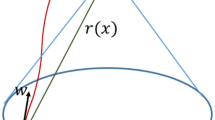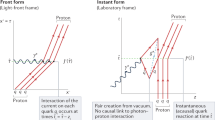Abstract
RECENTLY, Lyttleton and Bondi1 put forward the suggestion that the expansion of the universe is caused by the absolute values of the charges of the proton and electron not being equal, thereby giving a net charge to the hydrogen atom and causing mutual repulsion in the universe which may be considered as composed of a uniform distribution of hydrogen atoms. Inspection of the theory shows, however, that the 4-vector defined by electric current and charge is not Lorentz invariant and it is therefore of interest to see whether a Lorentz invariant system can be obtained.
This is a preview of subscription content, access via your institution
Access options
Subscribe to this journal
Receive 51 print issues and online access
$199.00 per year
only $3.90 per issue
Buy this article
- Purchase on Springer Link
- Instant access to full article PDF
Prices may be subject to local taxes which are calculated during checkout
Similar content being viewed by others
References
Lyttleton, R. A., and Bondi, H., Proc. Roy. Soc., A, 252, 313 (1959).
Watson, W. H., Proc. Second Symp. App. Math. Amer. Math. Soc., 49 (1950).
Chambers, Ll. G., Nature, 191, 262 (1961).
Milne, E. A., Relativity, Gravitation and World Structure, 75 (Oxford, 1935).
Whittaker, E. T., Aether and Electricity, 2, 41 (Nelson, 1953).
Author information
Authors and Affiliations
Rights and permissions
About this article
Cite this article
CHAMBERS, L. A Lorentz-invariant Universe with Charge Excess. Nature 198, 379–380 (1963). https://doi.org/10.1038/198379a0
Issue Date:
DOI: https://doi.org/10.1038/198379a0
Comments
By submitting a comment you agree to abide by our Terms and Community Guidelines. If you find something abusive or that does not comply with our terms or guidelines please flag it as inappropriate.



